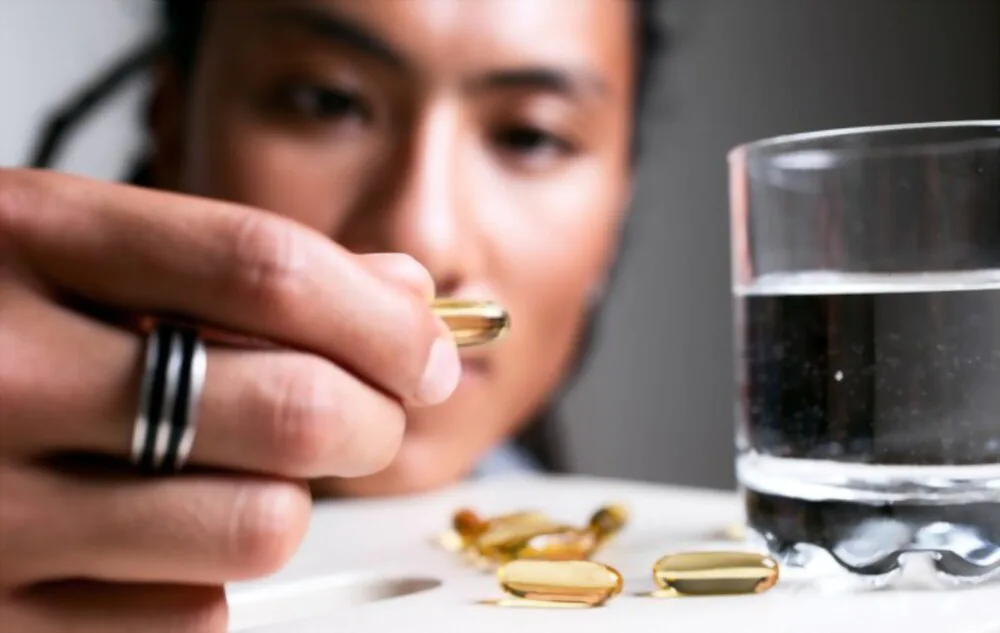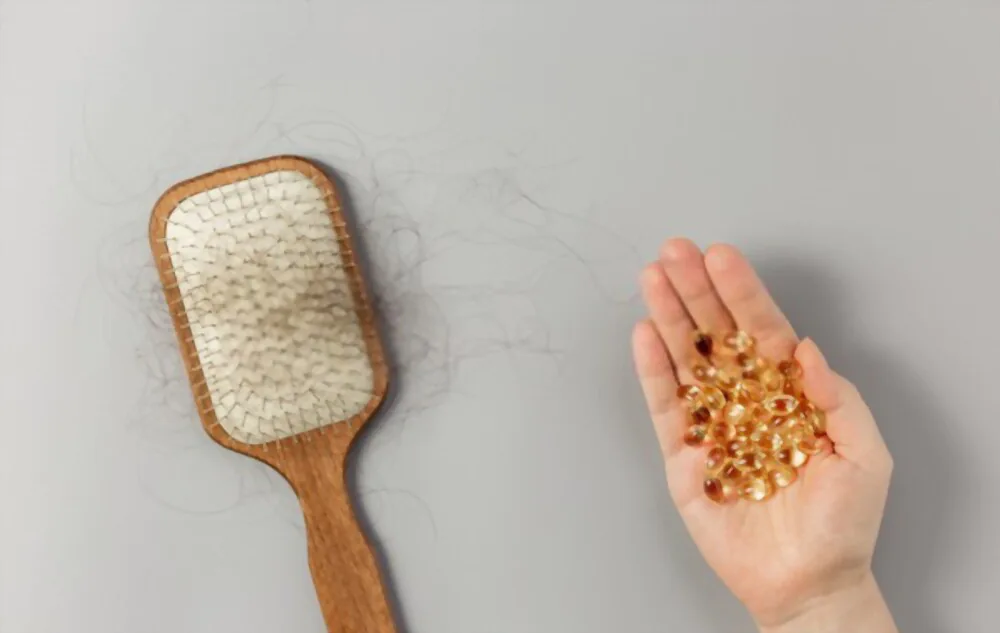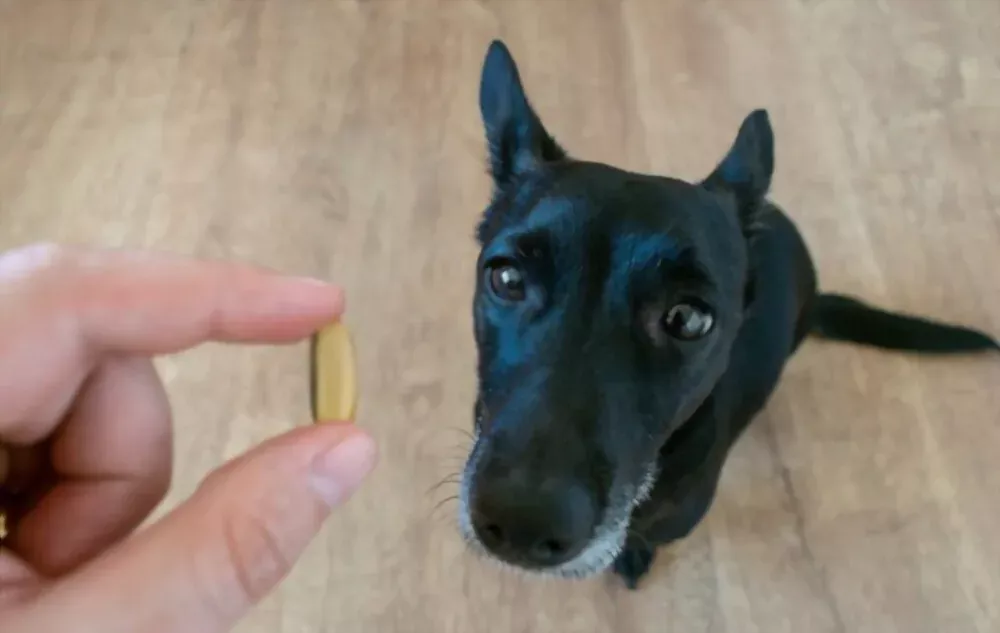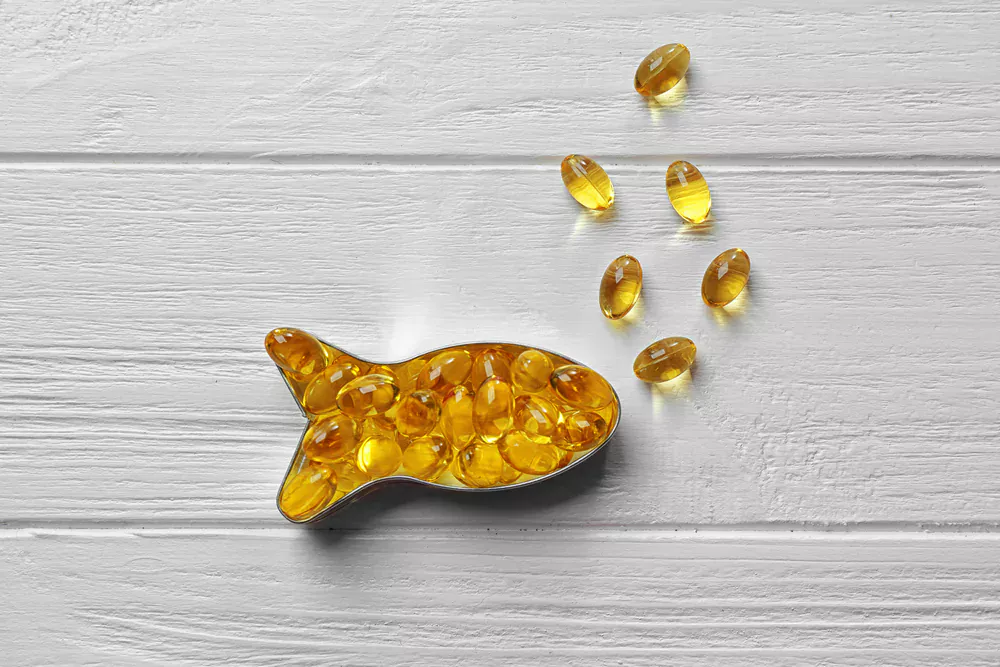If you’ve been surfing the Internet, you’ve no doubt come across a lot of information and claims about fish oil. Perhaps you’re asking yourself, is fish oil good for hair health? Or is it bad? What the heck are they even talking about? Before I began my supplement regime, I felt somewhat equally as confused as you might be right now.
Thankfully, my research enabled me to make an educated decision on the benefits of adding fish oil into my daily regimen, which ultimately led me down the road of becoming one of the few people I know who actually has silky soft good hair even when it’s humid and sticky outside.
A growing number of people use fish oil to help them with their hair care. And I must say that there are many reports on the Internet that support this fact. But, as it often happens in medicine, every case is different. Some users report fast positive changes in their hair and nails, others say that fish oil can take several months to show its effect.
So, if you’re serious about your hair loss, stick around and read the rest of this article.
- 1 What is Fish Oil?
- 2 Is Fish Oil Good For Hair?
- 3 Is Fish Oil Good For Thinning Hair?
- 4 Is Fish Oil Good For Dry Hair?
- 5 Is Fish Oil Good For Dog Hair?
- 6 How To Use Fish Oil For Hair Growth?
- 7 What Is the Best Form Of Fish Oil?
- 8 How Much Fish Oil Should You Take?
- 9 How Long Does It Take For Fish Oil to Work For Hair?
- 10 Side Effects Of Fish Oil
- 11 The Takeaway
What is Fish Oil?

Fish oil is a dietary supplement that’s rich in omega-3 fatty acids. It’s commonly taken to improve heart health and prevent heart disease.
Omega fatty acids are essential nutrients for our bodies, yet we can’t synthesize them from scratch. Therefore, we need to get them from our diet or supplements. Omega-3 fatty acids are abundant in certain types of fish and shellfish (1Trusted Source). Fish oil is the richest source of this type of fat (2Trusted Source).
Fish oil is sold in liquid form and contains omega-3 fatty acids in the form of eicosapentaenoic acid (EPA) and docosahexaenoic acid (DHA). These two fats have been linked to several health benefits, such as improved heart health.
Is Fish Oil Good For Hair?

Fish oil is a dietary source of omega-3 fatty acids, which are incredibly important for your body and brain.
Omega-3s are considered essential fatty acids. This means that they’re necessary for human health but the body can’t make them — you have to get them through food.
Studies have found that fish oil may help improve certain conditions that are related to hair loss, such as alopecia and eczema. However, research on fish oil’s direct effect on hair growth is limited.
Here’s what the research says about how fish oil may affect hair loss and regrowth in different situations.
Is Fish Oil Good For Thinning Hair?
Many people take fish oil supplements to support their cardiovascular health, but they might also help with thinning hair.
Fish oil is a rich source of omega fatty acids, a type of fat that is important for good health. The human body does not make omega-3s, so people must get them from their diet.
Many health experts believe that omega-3s can help improve conditions such as heart disease, arthritis, and depression. These fats may also have benefits for the skin and thinning hair.
One study found evidence to suggest that taking omega-3 supplements may help prevent male pattern baldness in some men. It also found that eating foods containing omega-3s might have similar effects.
However, there is no conclusive proof yet, so more research is necessary to confirm these results.
Is Fish Oil Good For Dry Hair?

Yes, fish oil is good for dry hair. The omega fatty acids and other nutrients in fish oil may help strengthen the hair shaft and moisturize your scalp.
What’s more, the anti-inflammatory properties of certain nutrients in fish oil may help reduce dandruff and soothe an itchy scalp.
Is Fish Oil Good For Dog Hair?

Fish oil is one of the most common supplements for dogs. It’s used to improve skin and coat health, as well as joint health. But is fish oil good for dog hair?
The benefits of fish oil for dogs are numerous, with some studies showing that it can help with everything from allergies to heart disease and cancer.
Fish oil for dogs is often recommended by veterinarians to treat a variety of illnesses and conditions, including:
- Skin issues like allergies or dry skin
- Joint pain like arthritis
- Heart issues including heart disease and congestive heart failure
- Kidney problems like kidney disease
- Gastrointestinal issues like diarrhea and constipation
- Cancer in dogs
How To Use Fish Oil For Hair Growth?
One of the best ways of adding fish oil into your diet is to include more fatty fish. Popular options include salmon, tuna, herring, sardines, and mackerel. These are all rich in omega fatty acids, but salmon contains a particular type that’s been linked to hair growth called docosahexaenoic acid (DHA). DHA aids in the production of prostaglandin E2, a chemical that’s essential for healthy hair growth.
To get a concentrated dose of omega-3s in supplement form, look for fish oil capsules or soft gels at your local drugstore or health store. You can also find products made with fish oil like Omega 3 Fish Oil Softgels with Coconut Oil by Nature Made® and Puritan’s Pride Omega-3 Fish Oil 1000 mg with Vitamin E & Lemon Flavor Softgels.
What Is the Best Form Of Fish Oil?

Two of the most popular forms of fish oil are liquid and capsules. Each has its own pros and cons, which include price, convenience, and taste.
“I’d say it’s about 50/50,” said Dr. David Katz, director of the Yale-Griffin Prevention Research Center in Derby, Conn. “Liquid fish oil is more expensive than capsules because you have to add flavorings to it.”
Fish oil capsules are more convenient for people who don’t like the taste of fish, said Dr. Keith Roach, chief medical officer for Sharecare, a health website based in Atlanta.
However, he added that if you’re looking for a certain amount of omega-3s each day, you may need to take more capsules than liquid omega-3s since liquids are often more concentrated than capsules.
How Much Fish Oil Should You Take?

The amount of fish oil you should take for optimal health depends on the type of fish oil. The standard dose of fish oil recommended by the European Food Safety Authority is 1 gram (1,000 milligrams) per day, but this is based on a general recommendation to consume omega-3 fatty acids.
The Institute of Medicine recommends that people get 0.16 grams (160 milligrams) of eicosapentaenoic acid (EPA) and docosahexaenoic acid (DHA) per day from their diet. You can get these omega-3 fatty acids from eating fatty fish or seafood, plant sources like algae, or taking supplements.
How Long Does It Take For Fish Oil to Work For Hair?
If you’re looking to prevent your hair loss and aren’t sure how long you’ll be on a fish oil regimen, you can always try to get a sense of how long it takes for significant results.
According to a study published in the Journal of the American Academy of Dermatology, it took between four and six months for participants to notice significant hair growth after taking fish oil supplements.
To get the best results, take an omega-3 supplement that includes EPA and DHA levels of at least 1,000 milligrams per day, and don’t take more than 6,000 milligrams per day of combined EPA and DHA.
“There isn’t enough evidence right now to say if there’s a maximum dose or not,” says registered dietitian nutritionist Abby Langer, MS, RD, CDE, author of The Pocket Idiot’s Guide to the New Food Pyramids. “What we do know is that there are benefits at higher doses.”
Side Effects Of Fish Oil
The known side effects of fish oil are diarrhea, stomach upset, and belching. These side effects are mild and infrequent, according to the University of Maryland Medical Center. If you experience any persistent or unusual side effects after taking fish oil, contact your doctor.
Allergic reactions to fish oil are rare but possible. Symptoms of an allergic reaction may include skin rash, hives, breathing difficulties, and swelling of the lips, tongue, or throat. If you experience any symptoms of allergy after taking fish oil, call 911 immediately.
If you have a bleeding disorder, do not take fish oil supplements without consulting your doctor first. Omega-3 fatty acids can slow blood clotting and may increase your risk of bleeding or bruising. Fish oil may also interact with certain blood thinners such as warfarin (Coumadin), clopidogrel (Plavix), and aspirin, according to the National Institutes of Health Office of Dietary Supplements.
Because omega-3 fatty acids can lower blood pressure in some people, do not take them if you also take other drugs that lower blood pressure. These drugs include ACE inhibitors such as captopril (Capoten) and enalapril (Vasotec) and diuretics such as furosem.
The Takeaway
It’s true that fish oil has many benefits, but it isn’t clear whether or not it can help grow hair or prevent hair loss. That being said, there is a fair amount of anecdotal evidence that suggests that taking fish oil supplements does have an effect on your hair.
If you are interested in trying fish oil for hair growth, be sure to speak to your doctor first.

